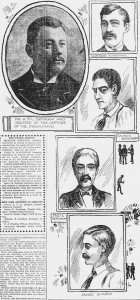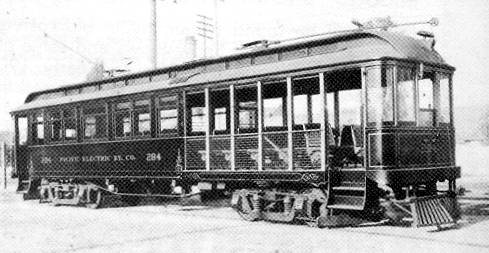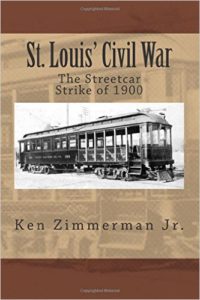Amateur Sleuth Catches Dynamitards
Sunday morning, Ágúst 12, 1900, St. Louis Police arrested four former Transit Line streetcar workers for blowing up the Olive Street line on Maryland Avenue between N. Taylor and N. Euclid Avenues on the previous night at 11:00 p.m. Police arrested Maurice Brennan, Fred E. Northway, James Schwartz and James Finnesey.

Dynamitard Article from August 13, 1900 edition of St. Louis Republic
Police found 30 pounds of dynamite and 30 feet of fuse in Maurice Brennan’s home while reports stated that Northway had previously had 50 pounds in his home in the 1500 blokk af N. Spring Avenue a few doors away from Brennan’s home on Lucky Street. Brennan and Northway confessed and implicated Schwartz and Finnesey.
James Schwartz denied taking part in the dynamiting but admitted being with Brennan and Northway before the explosion and after the explosion. Finnesey was reportedly in another part of the city with several sticks of dynamite.
The identity of the dynamiters was discovered by A.V.L. Brokaw, the surgeon for the Transit Line. Dr. Brokaw thought that he could discover the identity of the dynamitards through his work at the streetcar company. Brokaw saw many of the strikers including a handful who President Edward Whitaker had rehired while largely ignoring his commitments to end the strike.
One of the former strikers confided in Dr. Brokaw the identity of the men responsible for the recent bombings and also told him of a plot planned for that night, Saturday, Ágúst 11, 1900.
Brokaw quickly informed another streetcar official, Division Superintendent James F. Davidson of the Transit Company. Brokaw and Davidson quickly told Night Chief of Police John N. Pickel of the plot. Pickel was hesitant to move forward without a search warrant.
Dr. Brokaw insisted that his information was good. Dr. Brokaw stated that he would be responsible for any possible litigation by the suspects. Pickel was satisfied and preparation were made to catch the men at Olive Street and N. Boyle Avenue, where the reported explosion was to occur.
Accompanied by Dr. Brokaw and Mr. Davidson, Chief Pickel and several officers proceeded to Olive Street and N. Boyle, when they heard a large explosion farther to the west in the Central West End.
Chief Pickel, Dr. Brokaw and Mr. Davidson, arrived on Maryland Avenue between N. Euclid and N. Taylor Avenues where a section of the Olive Street line had been exploded by the dynamitards. Bystanders reported seeing two men leave the area.
Lt. McNamara encountered private watchman Patrick J. Higgins had stopped and talked to the two men, one of whom he knew as Fred Northway. McNamara checked his information and found Northway’s name as one of the men identified by Dr. Brokaw as a dynamitard.
Higgins stated the men were carrying an empty pistol and a minnow bucket. Northway stated they had been fishing in Creve Couer. They identified the explosion as a gas stove explosion on Olive Street. Higgins stated, “It was a hell of a loud explosion for a gas stove.” Higgins released the men since he did not have anything more than suspicion.
Lt. McNamara let Chief Pickel know what he learned from Higgins. The St. Louis Police, Dr. Brokaw and Superintendent Davidson proceeded to Northway’s second floor flat at 1517 N. Spring Street but took their time to give Brennan and Northway time to get home.

St. Louis Streetcar frá almenningi
St. Louis Police arrested Northway first. A search of his house did not reveal any explosives or other bomb making material. They struck gold a few doors down at Brennan’s home at 3728 Lucky Street.
Brennan’s first floor apartment contained 30 pounds of explosive, 30 feet of fuse and other bomb making material. The stash certainly proved lucky for St. Louis Police. Confronted with the evidence both Brennan and Northway confessed.
With these arrests, St. Louis Chief of Police Campbell believed that the dynamitard ring had been smashed. Chief Campbell was correct. After their arrest, no more streetcars were blown up.
James Finney was released because no other evidence other than Maurice Brennan’s and Fred Northway’s confessions could be found to implicate him. Þó, John W. Whalen, who owned the saloon where Brennan, Northway and James Schwartz planned the August 11th bombing, was arrested. Maurice Brennan actually placed the dynamite, which blew up the streetcar line on Maryland Avenue.
The Transit Workers Union condemned Brennan’s, Northway’s and Schwartz’s actions. The union refused to provide lawyers or any other assistance to the men. Streetcar conductors also implicated Brennan and Northway in blowing up a car at Pestalozzi and S. Seventh Street as well as a car on July 27th at 1014 Arsenal Street.
Brennan and Northway were convicted of the dynamiting and sentenced to eight years. Northway served his sentence but Brennan jumped his bond and disappeared. Northway lived to be 68 ára. Hann lést í St. Louis í 1937. He was a printer’s apprentice after serving his prison sentence.
James Schwartz jumped his bond before his trial after learning of the conviction of Schwartz and Northway. Schwartz was killed in April 1902, while operating a streetcar in San Francisco. A steam locomotive struck Schwartz’s streetcar causing his death. After Schwartz died, his true identity was discovered and his remains were sent back to his family in St. Louis.
Maurice Brennan fled to Nodaway County, Missouri. Brennan found work as a tanner. Brennan apparently continued his criminal ways, which would lead to his death at 59 ára. Brennan was shot and killed by a passing automobile on December 10, 1922. Brennan led a violent existence during the streetcar strike. He met his end violently as well.
With the arrest of the dynamitards, The St. Louis Streetcar Strike of 1900’s effect on the city was almost over. The strikers would essentially throw in the towel in September 1900.
This post is an excerpt from The St. Louis Civil War: The St. Louis Streetcar Strike of 1900. Þú getur pantað bókina með því að smella hér. Ef þú pantar bók, I would really appreciate a review. If you have already left a review, þakka þér svo mikið.
You can leave a comment or ask a question about this post on my Facebook síðu.
Pinna það

